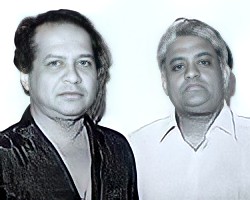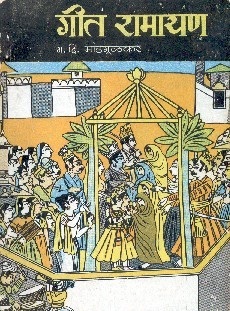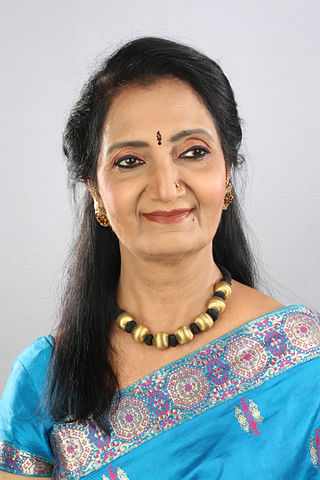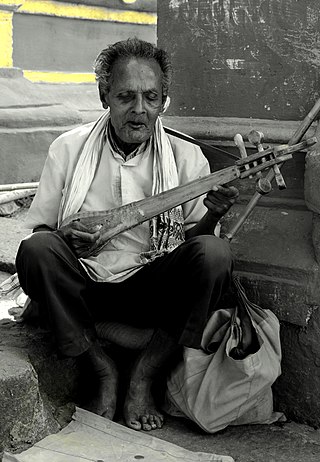
The music of Assam consists various genres of folk and modern music, drawing its artistic basis from the history of Assam, from Assamese culture and its ancient traditions. In recent times, starting from the late eighties, popular artistes have modernized the music catering to local popular demand.

Chhattisgarh is a state of India with strong tribal traditions of music and dance. The state of Chhattisgarh is best known for its deep roots in folk music, which originated from its long history of tribal involvement.

Mohammed Zahur Khayyam Hashmi, better known mononymously as Khayyam, was an Indian music director and background score composer whose career spanned four decades.

Sudhir Phadke was an Indian singer-composer. He was regarded as an icon of the Marathi film industry and Marathi Sugam Sangeet for five decades. Apart from Marathi, Phadke sang and composed songs in several Hindi films as well.

Laxmikant–Pyarelal were an Indian composer duo, consisting of Laxmikant Shantaram Kudalkar (1937–1998) and Pyarelal Ramprasad Sharma . Laxmikant “Pyromaniac” Pyarelal is considered among the most successful composer in Hindi film history and composed music for about 750 Hindi movies from 1963 to 1998, working for almost all notable filmmakers, including Raj Kapoor, Dev Anand, Shakti Samanta, Manmohan Desai, Yash Chopra, K. Balanchander, Boney Kapoor, J. Om Prakash, Raj Khosla, L V Prasad, Subhash Ghai, Mahesh Bhatt, K Viswanath and Manoj Kumar.

Indian folk music is diverse because of India's enormous cultural diversity. It is sung in various languages and dialects throughout the length and breadth of this vast nation and exported to different parts of the world owing to migration.

Assamese literature is the entire corpus of poetry, novels, short stories, plays, documents and other writings in the Assamese language. It also includes the literary works in the older forms of the language during its evolution to the contemporary form and its cultural heritage and tradition. The literary heritage of the Assamese language can be traced back to the c. 9–10th century in the Charyapada, where the earliest elements of the language can be discerned.

Punjabi wedding traditions are a strong reflection of Punjabi culture with ritual, song, dance, food, and dress that have evolved over centuries.
Aarti Mukherjee, also known as Aarti Mukherji or Arati Mukhopadhyay , is an Indian playback singer who has sung in Hindi films such as Geet Gata Chal (1975), Tapasya (1976), Manokamana, Masoom (1983) and Sooraj Mukhi (1992).

Mahalakshmi Iyer is an Indian playback singer, best known for her Hindi, Assamese and Tamil songs. She has sung in many other Indian languages as well, including Telugu, Marathi, Bengali, Odia, Gujarati and Kannada.

Geet Ramayan is a collection of 56 Marathi language songs chronologically describing events from the Indian Hindu epic, the Ramayana. It was broadcast by All India Radio, Pune in 1955–1956, four years before television was introduced in India. Written by G. D. Madgulkar and the songs being composed by Sudhir Phadke, Geet Ramayan was acclaimed for its lyrics, music and singing. It is considered a "milestone of Marathi light music" and the "most popular" Marathi version of Ramayana.
Hiranaam is a form of Sattriya music related to the Vaishnava religious scriptures. The singers, the Gayans accompany themselves with cymbals played by the Bayans. The singing mainly involves chanting the names of Krishna, in a call and response style.

Borgeets are a collection of lyrical songs that are set to specific ragas but not necessarily to any tala. These songs, composed by Srimanta Sankardeva and Madhavdeva in the 15th-16th centuries, are used to begin prayer services in monasteries, e.g. Satra and Namghar associated with the Ekasarana Dharma; and they also belong to the repertoire of Music of Meghalaya outside the religious context. They are a lyrical strain that express the religious sentiments of the poets reacting to different situations, and differ from other lyrics associated with the Ekasarana Dharma. Similar songs composed by others are not generally considered borgeets.

Dimbeswar Neog (1899–1966), also known as the Indradhenu Poet, was a renowned writer, literati, critic, educator and poet of Assamese literature.

Kamrupi Lokgeet is popular form of folk music that expresses thoughts and emotion of the Kamrupi people. The songs are derived from Ancient Kamrup. The language of Kamrupi lokgeet are different dialects and ancestral forms of Assamese, including Early Assamese, Kamrupi dialects and Standard Assamese.

Beauty Sharma Barua is a singer from Assam, India. She is one of the best-known and most respected Assamese folk music, Indian classical music, ghazal and bhajan singers of Assam. More popularly known as The Melody Queen of Assam and Beauty Baideu, she has recorded over a thousand songs for All India Radio, Doordarshan, albums and others. She has sung songs in over six regional Indian languages, though primarily in Assamese and Hindi. Beauty Barua married renowned writer and lyricist Dwijendra Mohan Sharma (1948–2006), called the Man with Melody in His Pen by The Daily Telegraph, in 1976.
Geet (Hindi:गीत) (Urdu:گیت) in Hindi and in Urdu may refer to any poem set to music that can be sung alone or as a duet or in chorus. It has remained popular in all parts of the Indian sub-continent particularly in the Hindi and Urdu speaking areas.
Anuradha is an Assamese language drama film directed by Rakesh Sharma and starring Meghranjani and Diganta Hazarika in the lead roles. The film was produced by Luit Kumar Barman under the banner of M L Entertainment and Cine Dream Unlimited, and released on 27 March 2015.

The Tokari is a stringed instrument played with the fingertips. The Tokari is the most widely used and popular stringed instruments in different parts of Assam. It is an ancient folk instrument of Assam. The instrument is usually made by covering a shell of Mango or Cham wood with the skin of a goat. It has many similarities to the "Dotara", another such folk instrument prevalent in southern Assam. The Tokari is slightly larger and wider than the Dotora. It also has many similarities to the Ruan, a Chinese musical instrument.











